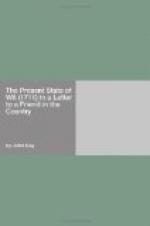In addition to the Tatler and Spectator Gay discusses a dozen other periodical publications which are of some interest to-day. Dr. King’s “monthly Philosophical Transactions,” mentioned in the third paragraph, had begun as a parody of the Royal Society’s publications, but they had failed to hold the public interest, in spite of the wit of the author of the Art of Cookery: “though that gentleman has a world of wit..., the town soon grew weary of his writings.” King’s Useful Transactions in Philosophy had in fact run to only three numbers in the early months of 1709. The Monthly Amusement of John Ozell, mentioned in the following paragraph, which Churton Collins erroneously considered to be not a periodical but “simply his frequent appearances as a translator” (p. xxxii)—a statement, repeated by Lewis Melville in his Life and Letters of John Gay (London, 1921, p. 12)—ran for only six numbers, from April to September 1709. Gay’s statement that it “is still continued” may refer to the better known Delights for the Ingenious; or a Monthly Entertainment for the Curious of Both Sexes (edited by John Tipper) which was currently appearing in 1711.
As to the political papers Gay’s observations are moderate in tone. Defoe’s Review (1704-13) and The Observator (1702-12), begun by John Tutchin, are noticed in rather supercilious fashion. The Examiner (1710-14) is damned with faint praise: though “all men, who speak without prejudice, allow it to be well written” and “under the eye of some great persons who sit at the helm of affairs,” Gay’s admiration is reserved for its two chief opponents, Addison’s short-lived Whig Examiner (1710) and The Medley (1710-12).
The real hero of the pamphlet, however, is Richard Steele, with his coadjutor Mr. Addison, “whose works in Latin and English poetry long since convinced the world, that he was the greatest master in Europe of those two languages.” The high praise which Gay lavishes upon this pair—comparable in their own field, he says, to Lord Somers and the Earl of Halifax—is eloquent testimony to the immense interest aroused by their two papers in the London of 1709-12. There is no need to review here the particulars of Gay’s eulogy, but one or two points may be noted. In the first place, Gay’s remarks are not extravagant when compared with other contemporary testimony. Many of these tributes were brought together by Aitken in his monumental biography of Steele, and since 1889 other contemporary sources have been published which give corroborating support. Hearne first mentions the Spectator on April 22, 1711, in a comment on No. 43, and even this crusty Tory and Jacobite notes in his diary: “But Men that are indifferent commend it highly, as it deserves” (Remarks and Collections, ed. Doble, III, Oxford, 1895, p. 154). The published reports of the Historical Manuscripts Commission,




